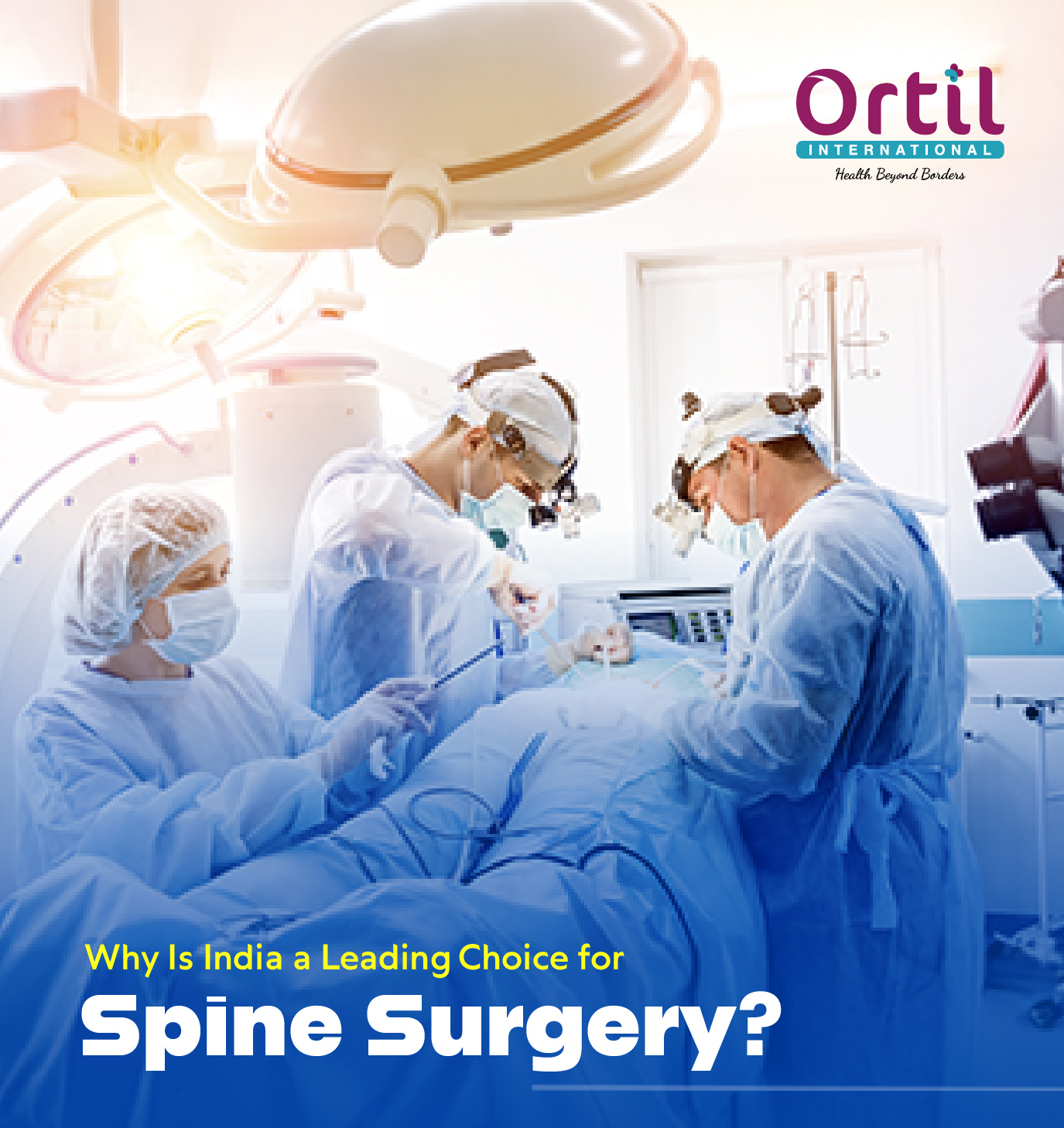Why India Is a Top Destination for Spine Surgery
Summary
Spine surgery offers considerable accuracy and better results. India has rapidly become a significant global hub for spine surgery. This rise is primarily driven by their highly experienced medical professionals, state-of-the-art facilities, and the significant cost savings they offer
Introduction
Spine surgery is a vital solution for those suffering from chronic back pain, disc hernia, spinal stenosis or degenerative conditions of the spine. India has become a global leader in spine surgery, offering high success rates, cutting -edge technology, world surgeons and affordable care.
Understanding of Spine Surgery in India
The medical scenario of India witnessed a revolution in spine care. Hospitals from major cities are equipped with advanced diagnostic tools, robotic technologies and assisted by navigation and dedicated spine centres.
What is Spine Surgery
Spine surgery refers to a series of surgical procedures performed to correct abnormalities, treat lesions or relieve pain and neurological symptoms of the spine.
Types of Spine Surgery
-
Discectomy (or micro discectomy): removal of part or a whole or damaged hernia disk that is pressing the nerves usually performed for lumbar (lumbar) or cervical (neck) problems.
-
Laminectomy: Removal of part or the entire blade (the back of the vertebra) to create more spinal canal space, commonly used to treat spinal stenosis.
-
Fusion of the spine: Two or more vertebrae permanently using bone grafts or metal hardware (screws, rods) to stabilize the spine reduce movement pain and prevent further damage.
-
Artificial disc replacement (ADR): Replacing an artificial disc made of metal and plastic, offering an alternative to fusion, preserving the mobility of the spine.
Who Needs a Spine Surgery
-
Hernia of discs or protuberances: When the soft cushion between vertebrae breaks or projects, pressing the nerves.
-
When the spinal canal narrows, a condition called spinal stenosis, it can really cause problems because it starts to compress the delicate spinal cord or the nerves leading out to your body.
-
Degenerative disk disease: spinal discs wear, leading to reduced pain and function.
-
Scoliosis and other vertebral spine deformities: abnormal curvatures of the spine that cause pain restrict mobility or affect breathing.
Pre-Procedure (Preparation Phase)
-
Detailed evaluation
-
Medication review
-
Lifestyle changes
-
Preoperative education
-
Home preparation
-
Preoperative baths
Post-Procedure (Recovery and Follow-Up Phase)
Why Choose India for Spine Surgery
-
Cost Effectiveness: Spine surgery in India is significantly more accessible compared to Western countries (usually 60-80% less than in the US or UK) without compromising quality.
-
High quality medical infrastructure: Many hospitals in India are equipped with cutting -edge technology, including robotic surgery systems, intraoperative navigation and advanced imaging facilities, adhering to international standards (accredited by NABH/JCI).
-
Specialization in spine surgeons: India has a large set of highly qualified and experienced column surgeons who successfully performed thousands of complex procedures.
-
Patients can usually schedule surgery much faster in India compared to countries with long waiting lists.
Top Hospitals in India for Spine Surgery
-
Max Super Speciality Hospital, Saket, Delhi
-
Medanta – The Medicity, Gurugram
-
Artemis Hospital, Gurugram
-
Indraprastha Apollo Hospital, Delhi
-
Kokilaben Dhirubhai Ambani Hospital, Mumbai
-
Indian Spinal Injuries Centre, New Delhi
-
Fortis Hospital (various locations like Bangalore, Gurugram)
-
Manipal Hospital, Delhi/Bangalore
-
BGS Gleneagles Global Hospitals, Bangalore
-
Apollo Hospital, Bangalore
Cost of spine surgery in India
For international patients, the cost of spine surgery in India is a major selling point. While it's considerably less expensive than in Western countries, the actual price can fluctuate based on various factors
Cost Components
Pre-operative Evaluation and Tests:
Transplant Procedure and Hospital Stay:
-
Surgeon's fee.
-
Anaesthesia charges.
-
Operation theatre charges.
-
Cost of implants (if required, e.g., screws, rods, artificial discs – this can be a significant component, especially for imported implants).
-
Hospital stay charges (including room rent, nursing care, and basic amenities).
Post-operative Medications and Follow-up Care:
-
Cost of medications administered during hospital stay and for discharge.
-
Physiotherapy and rehabilitation sessions.
-
Post-operative consultations and follow-up care.
-
Miscellaneous expenses (e.g., medical supplies, specific nursing care).
Total Estimated Cost
-
Pre-operative consultation and diagnosis: ₹4,000 - ₹5,000
-
Diagnostic tests and imaging: ₹10,000 - ₹20,000
-
Surgeon's fee: ₹50,000 - ₹1,00,000
-
Anesthesia charges: ₹10,000 - ₹20,000
-
Cost of implants (if required): ₹50,000 - ₹2,00,000
-
Hospital stay (including room charges): ₹20,000 - ₹50,000
|
Country
|
Amount
|
|
USA
|
$60,000 - $100,000
|
|
UK
|
$30,000 - $50,000
|
|
India
|
$3,000 - $8,000
|
Cost Comparison in Countries
Factors Influencing Success
-
Diagnosis: Precise understanding of the spinal condition.
-
Patient selection: careful selection of appropriate candidates.
-
Surgeon specialization: highly qualified and experienced surgeons.
-
Surgery type and complexity: Minimally invasive procedures usually have faster recovery.
-
Patient General Health: Coexistent conditions may affect healing.
Challenges and Solutions
Challenges:
-
Although English is widely spoken in hospitals, differences in languages may still occur.
-
Long -term follow -up after returning to the country of origin may be a concern.
-
Ensuring the quality of care may be a concern for some patients.
-
Adaptation to new cultural norms and eating habits can be a challenge.
Solution:
-
Respectable medical tourism facilitators and hospital patients' tables provide comprehensive care with travel agreements, visa processing, accommodation and local logistics.
-
Many Indian hospitals offer telemedicine services for consultations and virtual follow -ups.
How We Help
-
Offer detailed facts: on various surgeries as performed by you, your indications and recovery.
-
Find main hospitals and doctors: based on available statistics and reputable sources.
-
Explain cost components: to help you understand the financial aspects.
-
Offer preparation and recovery tips: Based on general medical guidelines.
Legal and Ethical Considerations
-
Patients should provide informed consent.
-
Hospitals are dedicated to patient privacy and confidentiality
-
India has legal frameworks for medical negligence.
-
The selection of NABH/JCI accredited hospitals guarantees quality and safety standards.
Recovery and Life after Treatment
-
The recovery phase (weeks to months) is dedicated to physical therapy.
-
Changes in lifestyle and pain control are essential to long-term health.
-
Getting back to work or leisure is a gradual and physician-directed process.
Conclusion
Spine surgery of the vertebral spine in India proves to be an attractive option for the needs of high-quality, advanced, and affordable spinal care. Equipped with qualified surgeons, modern hospitals, and a patient-centered approach, India has ensured that it stands at an edge on the global market for medical tourism that deals with spine-related conditions.
FAQs
Q1: If I get spine surgery in India, how long will I typically be in the hospital?
It usually ranges from 3 to 7 days, depending on the complexity of the procedure and recovery of the patient.
Q2: Is surgery available in India?
Yes, spine surgery techniques are widely available and increasingly preferred in major India hospitals due to their smaller incisions, less pain and faster recovery.
Q3: What are the success rates of spine surgery in India?
Success rates vary according to individual procedures and factors, but the main hospitals and Indian surgeons report high success rates, usually comparable to international standards, especially for common procedures such as disco and fusion.
















.webp)

